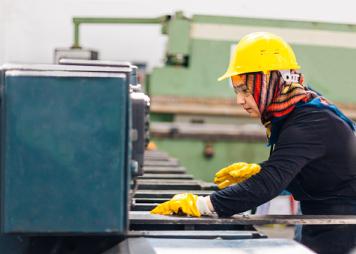Why is it Indigenous People's Day?

It is no secret that the Pilgrims who landed upon Plymouth survived thanks to the support from the Native American tribes of the area, even if the extent of this help is still under acknowledged in our country's history. Across America great indigenous civilizations established communities with their own governments, social, political, medical, agricultural, artistic, and other advancements- before Columbus “discovered” America.
It is this recognition of the original people who occupied American lands, and were the core support of survival for Europeans who came across their lands, that makes the recognition of indigenous people important.
In 2021, President Biden proclaimed federal Indigenous Peoples Day as October 12. This came after the unified advocacy by Indigenous peoples and their allies. The movement for recognition of October 12 as Indigenous Peoples Day began in Berkeley, California, following a march called by the American Indian Movement in San Francisco on October 10, 1992. Since then, 14 states, Washington, D.C., and over 130 cities have recognized Indigenous Peoples Day instead of Columbus Day.
Honoring Indigenous History in the U.S.
In addition to more advocates working to get this day recognized, there is an effort to teach the full history of Native peoples in schools across the U.S. Bill Tammeus, commentator and writer of the "Faith Matters" blog for the Kansas City Star, writes in detail about the importance of continuing to push for these changes.
“That sad history of cultural genocide has moved us to find out what role various faith communities played in it. Many, in fact, were involved, including us Presbyterians, Methodists (who ran the Shawnee Indian Mission), Catholics, Quakers and others. It’s what happens when religious institutions adopt the cultural and political views of the broader society without adequate and careful theological analysis. The same thing happened to churches that justified slavery and then, later, favored legal racial segregation.”
Understanding our country’s origins better helps each of us understand our own, and further supports the effort to treat every person with respect and equality. Indigenous People’s Day is a step in the right direction to create a more open and unified America, giving credit to our original people who, above all, loved our land and continue to treat it as sacred.
Observing Indigenous People's Day
Here are some resources to learn more about Native people and celebrate Indigenous People’s Day:
- Decolonize Myself - A First Nations Perspective: www.facebook.com/decolonizemyself
-
Let’s Talk Native podcast with John Kane: www.letstalknative.com
-
Native Opinion podcast: www.nativeopinion.com
-
An Indigenous Peoples' History of the United States book by Roxanne Dunbar-Ortiz
-
Sand Talk: How Indigenous Thinking Can Save the World book by Tyson Yunkaporta
-
The Trail of Tears Across Missouri book by Joan Gilbert
-
National Museum of the American Indian: https://americanindian.si.edu
-
Native Land Website: www.native-land.ca
One Percent For America recognized Indigenous People's Day and the myriad of accomplishment and contributions that Indigenous people have made to the U.S. and all countries globally. Because we are each immigrants in the U.S. supporting others on their path to citizenship is as important as recognizing our roots. This is why we invite you to join our community as a borrower or an investor. Because citizenship benefits us all.



